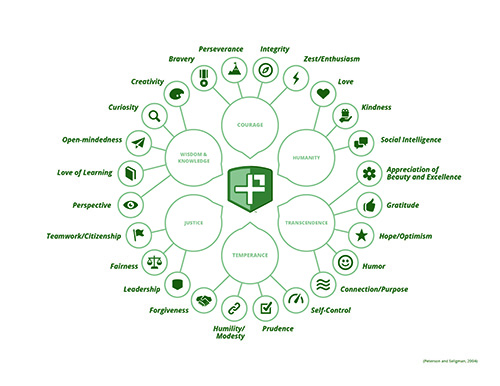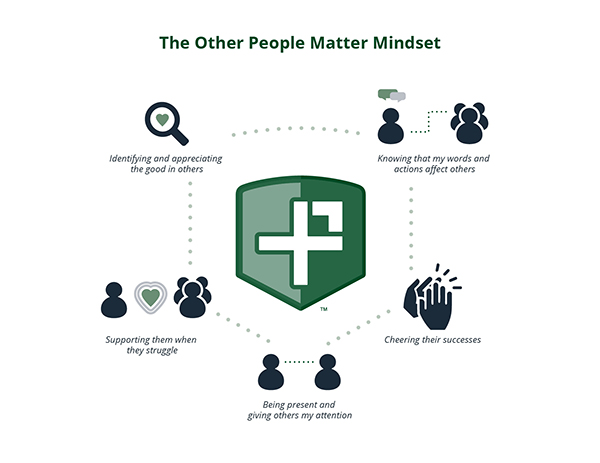Character Building
Positivity Project
The vision is to create citizens and leaders who will enhance our communities and country by internalizing the belief that “Other People Matter.” Positive psychology’s scientifically validated 24 character strengths serve as its foundation. Positive psychology teaches that people have all 24 strengths within them – and that character is not just skills or behaviors, but rather an intrinsic part of each of us.
The 24 Character Traits and Calendar
Teachers are given resources and training on the 24 character strengths.
| September 13-19 | Other People Matter Mindset - Intro Week |
| September 20-26 | Curiousity |
| September 27- October 3 | Teamwork |
| October 4-10 | Open-mindedness |
| October 11-17 | OPM2- Being present and giving others my attention |
| October 18-24 | Forgiveness |
| October 25-31 | Creativity |
| November 1-7 | Perspective |
| November 8-14 | Bravery |
| November 15-21 | Gratitude |
| November 22-28 | Gratitude |
| November 29 - December 5 | Kindness |
| December 6-12 | OPM- Knowing my words & actions affect others |
| December 13-19 | Self-Control |
| January 3-9 | Optimism |
| January 10-6 | Prudence |
| January 17-23 | Perseverance |
| January 24-30 | OPM - Supporting others when they struggle |
| January 31 - February 6 | Integrity |
| February 7-13 | Love |
| February 14-20 | Humility |
| February 21-27 | OPM- Cheering others' success |
| Feb. 28 - March 6 | Enthusiasm |
| March 7-13 | Social Intelligence |
| March 14-20 | Love of Learning |
| March 21-27 | Wildcare/Make-Up |
| March 28 - April 3 | Humor |
| Apr. 4 -10 | OPM- Identifying & appreciating the good in others |
| April 11-17 | Fairness |
| April 18-24 | Appreciation of Beauty |
| April 25- May 1 | Purpose |
| May 2 - 8 | Leadership |
| May 9-15 | Other People Matter Mindset - Outro Week |
More about the Positivity Project
The Positivity Project is a 501c3 non-profit organization dedicated to helping America’s youth build stronger relationships by recognizing the character strengths in themselves and others. Their vision is to create citizens and leaders who will enhance our communities and country by internalizing the belief that “Other People Matter.” Positive psychology’s scientifically validated 24 character strengths serve as its foundation. Positive psychology teaches that people have all 24 strengths within them – and that character is not just skills or behaviors, but rather an intrinsic part of each of us.
The Positivity Project is not a program with strict guidelines. Instead, it educates teachers on the character strengths and relies on them to teach in a way that best meets their students’ needs. It is a school-wide endeavor, grounded in the consistency of daily classroom instruction. Their model is holistic; it incorporates students, educators, and parents through regular interaction with character strengths vocabulary and concepts.
The project will help educators instill vocabulary and the meaning of the strengths through explicit teaching of each strength for 10 minutes per day. Schools will dedicate 1-2 weeks to each strength to help students understand them through definition, examples, discussions, and exercises. Schools and educators are encouraged to tailor the materials for their own best use, as they know their students and curriculum better than anyone else.
Responsive Classroom
The Responsive Classroom approach is a way of teaching that emphasizes social, emotional, and academic growth in a strong and safe school community. Developed by classroom teachers, the approach consists of practical strategies for helping students build academic and social-emotional competencies day in and day out.
Responsive Classroom Core Belief
In order to be successful in and out of school, students need to learn a set of social and emotional competencies—cooperation, assertiveness, responsibility, empathy, and self control—and a set of academic competencies—academic mindset, perseverance, learning strategies, and academic behaviors.
Guiding Principles
The Responsive Classroom approach is informed by the work of educational theorists and the experiences of exemplary classroom teachers. Six principles guide this approach:
- Teaching social and emotional skills is as important as teaching academic content.
- How we teach is as important as what we teach.
- Great cognitive growth occurs through social interaction.
- What we know and believe about our students—individually, culturally, developmentally—informs our expectations, reactions, and attitudes about those students.
- How we work together as adults to create a safe, joyful, and inclusive school environment is as important as our individual contribution or competence.
- Partnering with families—knowing them and valuing their contributions—is as important as knowing the children we teach.



